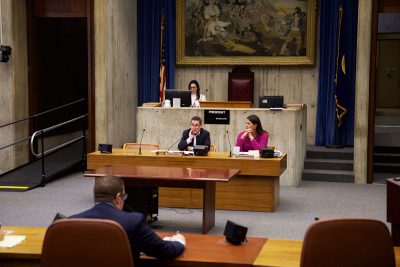
A small group of journalists and Boston residents gathered in the Iannella Chamber at Boston City Hall Tuesday afternoon for a City Council meeting discussing marijuana legislation with regard to a recent Cannabis Fact-Finding Trip.
Shawn Collins, the director of policy and legislative affairs at the Massachusetts State Treasury, and Jessica Taubner, the chief of staff for City Councilor Ayanna Pressley, spent a week in Denver, Colorado in April, learning about how the drug’s legalization impacted the commonwealth.
Collins said during the meeting that marijuana policies in Massachusetts will be stricter than those in Colorado, and marijuana grown in Massachusetts will not be allowed to leave the state.
As is the case in Colorado, marijuana in Massachusetts will be tagged with a radio frequency identification chip, which tracks the plant from the day it becomes a seed to the day it is sold, Collins said.
“At this juncture, we are thinking about what kind of commissioners we want to have at the Cannabis Control Commission, and the primary focus is looking with our sister agencies to find an office location,” Collins said.
Taubner said the team met with officials from the Drug Policy Alliance and the National Cannabis Industry Association and other organizations during the trip to brainstorm strategies for marijuana regulation in Massachusetts.
“I ended up meeting with a local Latino leader who said that in Denver, a lot of the initial retail shops were placed in the lower-income neighborhoods,” Taubner said. “These neighborhoods are not getting any benefits [from the marijuana industry], compared to some of the residential neighbor[hoods] that we travel to where the business community is thriving.”
Taubner addressed the opportunity for increased diversity in the marijuana industry, sharing that less than one percent of dispensary owners in the 25 states where marijuana is legal are people of color.
“Our law, which is the most broad language relative to equity in the country, requires the Cannabis Control Commission to develop procedures and policies to promote and encourage full participation in the regulated marijuana industry by people from communities that have been previously disproportionately harmed by marijuana enforcement,” Taubner said.
To diversify the marijuana industry, Taubner suggested establishing a city-level working group that includes local community experts’ voices in developing zoning policies and procedures that foster equity across Boston.
“[Communities in Denver] have an increase in poverty values,” Taubner said. “So, for Boston, [we need] to be very intentional about zoning, so … we don’t have a disproportionate concentration [of dispensaries] in any particular neighborhood.”
Pressley addressed the possibility of a monopoly in the marijuana industry, since there is no limit to the number of licenses any one person or company can control.
“We need to consider residency requirements,” Pressley said. “We don’t want any entrepreneur or any big players to monopolize the market and just to be able to have as many licenses as they are able to procure or just come from outside and just buy up everything.”
Several Boston residents expressed their support for the legalization of marijuana, but said the industry should be regulated to prevent unintended negative consequences.
Guillermo Torres, 37, of Downtown Boston, said the legalization of marijuana is “fine,” but noted several areas where the drug should be regulated.
“I think marijuana is good, but we really want to combat drug dealers coming in from foreign countries … and [help] families that have [been affected by drug abuse],” Torres said.
Tanisha Gray, 25, of Allston, cited her personal experience as a reason why she supports the legalization of marijuana.
“I have glaucoma, so I don’t see it as [negative] if it can help people with medical illnesses as well as with relaxation,” Gray said.
Gray also noted several challenges that Massachusetts lawmakers face as they approach the regulation of marijuana.
“There’s not a way to put a cap on [distribution] because marijuana is already being sold,” Gray said. “The government isn’t able to regulate it even if they want to. People will still find cheaper means of distributing it.”
Haley Fritz contributed to the reporting of this article.
















































































































